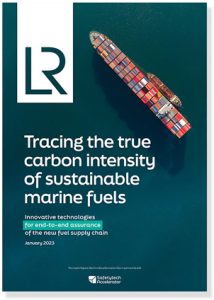Tracing the True Carbon Intensity of Sustainable Marine Fuels
27/01/2023 Tracing the True Carbon Intensity of Sustainable Marine Fuels. New methods for well-to-wake assurance of shipping’s new fuel supply chain will be essential to achieving zero carbon emissions
Tracing the True Carbon Intensity of Sustainable Marine Fuels. New methods for well-to-wake assurance of shipping’s new fuel supply chain will be essential to achieving zero carbon emissions
A new report from Safetytech Accelerator and the LR Maritime Decarbonisation Hub highlights the role of technology in enabling the shipping industry to develop specific mechanisms to track, verify and assure the true carbon intensity of sustainable marine fuels.
Shipping’s decarbonisation is focused on delivering alternative fuels that significantly reduce greenhouse gas (GHG) emissions. However, to be sure that alternative fuels can achieve the GHG reductions needed, emissions from the end-to-end supply chain of these fuels must also be measured, from the resource used to produce the fuels, to their consumption onboard the ship.
The key challenge facing the industry is that ship operators can lack visibility over the supply chain responsible for producing, delivering and bunkering a fuel used on their ships. A marine fuel can be presented as carbon-neutral, but could release substantial emissions when measured on a life-cycle assessment or well-to-wake basis.
Furthermore, alternative fuels may take diverse grey or blue production routes, thus delivering fuels that are often blended, mixed or re-labelled during transportation and distribution before they reach their final users. Consequently, there is no guarantee that fuel bunkered retains the same carbon footprint as the fuel that left the production facility.
For this reason, Safetytech Accelerator and LR Maritime Decarbonisation Hub have explored technologies that can track the true carbon intensity of hydrogen and ammonia, two of the most promising long-term alternative fuel candidates for shipping’s energy transition.
Working with two technology vendors, TYMLEZ and Authentix, the collaboration resulted in a joint report, Tracing the true carbon intensity of sustainable marine fuels which examines new methods of tracing information on how a fuel is being produced, from the source of the electricity used in the production process, to the delivery of an un-altered final product.
The first method is through the TYMLEZ solution, which utilises a ‘guarantee of origin’ (GO) scheme where each unit of hydrogen or ammonia is certified through a live facility data platform that can capture emissions data during the production process, such as water and fuel usage and grid electricity consumption. Blockchain technology is deployed for green hydrogen and green ammonia tracking systems.
Following the production and supply of the fuel that is accompanied with a GO certificate, the second method is applied through the Authentix approach, which offers downstream assurance. The Authentix solution can account for any blending or miss-labelling of the fuel through the use of a synthetic marker system, where the fuel is evaluated via chemical detection of the origin of the fuel, as well as any occurred dilution.
Given the varied production routes of sustainable marine fuels, it is essential to develop new carbon tracing authentication methods to ensure that the new fuels purchased are being produced, transported and stored in a way that will deliver emissions performance expectations.
Charles Haskell, LR Maritime Decarbonisation Hub Director, said: “The complexity of the marine fuel supply chain, with its diverse production methods, presents significant challenges to the shipping industry as the definition of sustainability is extended to include all stages of well-to-wake emissions. We hope that this joint study can serve as the basis for synergies and pilot projects to emerge and further contribute to the discussions for the development of new industry standards that can authentically validate the environmental and commercial impact of these new fuels.”
Dr. Maurizio Pilu, Safetytech Accelerator Managing Director, said: “The assurance of new green fuels, whether in terms of safety, origin, carbon footprint, is going to be a key component of the journey towards maritime decarbonisation. The right technologies could make the assurance process cost-effective, reliable and scalable. I am pleased that Safetytech Accelerator had the opportunity to collaborate with the Lloyd’s Register Maritime Decarbonisation Hub and the Authentix and Tymlez to understand how technologies such as theirs, could be used in future assurance processes.”
Daniel O’Halloran, Executive Chairman of TYMLEZ, said: “We are extremely excited by the release of this report as it showcases the role of technologies such as the TYMLEZ Platform in the decarbonisation of the maritime industry. The guarantee of origin of sustainable fuels such as green hydrogen and green ammonia will be paramount for proving decarbonisation efforts across the industry. It is therefore vital that technologies that can verify the origin and green credentials of these fuels with total trust and transparency be utilised. The TYMLEZ Guarantee of Origin solution detailed in this report provides shipowners and operators total assurance over the sustainability credentials of the fuels they’re using to power their vessels.”
Jim Seely, Vice President of Solutions for Authentix, said: “We have been a pioneer in fuel quality and authentication since our beginnings 27 years ago and this continues today. We are excited to be involved in this innovative project to provide the most advanced technology available for the assurance and verification of green fuels required by the maritime industry in its long-term goal toward decarbonisation.”
Download the report: Head over to the LR Maritime Decarbonisation Hub page to download the report here

